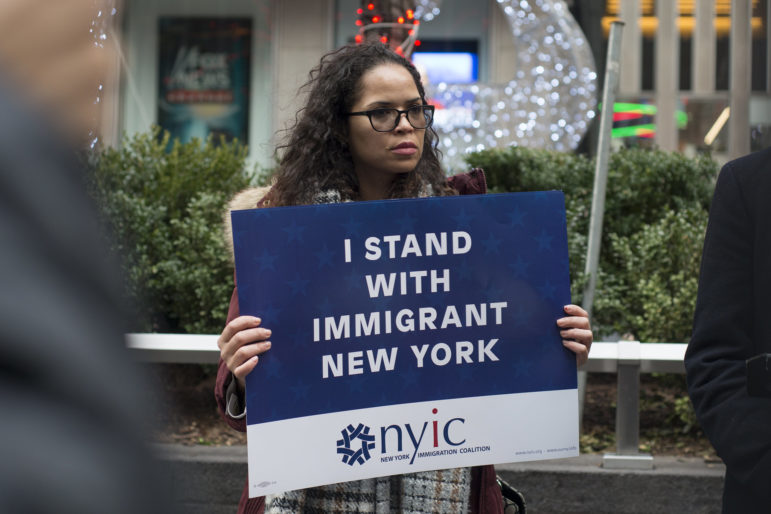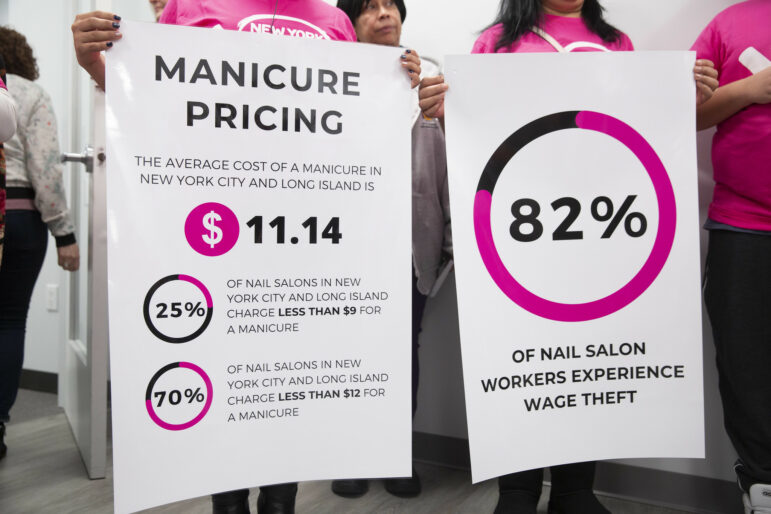The state legislature—which officially ended its session last week, though the Assembly is expected to return briefly before the end of the month—has so far failed to pass major legislation that advocates say would have a direct impact on the state’s growing immigrant communities.

Jeff Reed/NYC Council
Advocates and elected officials at a rally for immigrant New Yorkers in 2018.
For immigrant advocates, this year has been unusual: New York has been targeted by political leaders from other parts of the country, who for months on and off have sent asylum seekers from the border. Tens of thousands of those new arrivals remain in the city’s overwhelmed shelter system, which in turn has begun voluntarily transporting migrants to other counties around the state.
At the same time, the state legislature—which officially ended its session last week, though the Assembly is expected to return briefly before the end of the month—has so far failed to pass major legislation that advocates say would have a direct impact on the state’s growing immigrant communities.
“This is a disappointing legislative year,” said Theodore Moore, New York Immigration Coalition’s vice president of policy and programs.
Advocates this year are focused on pushing for three specific pieces of legislation which they hope will be taken up by Assembly members in the special session, which begins on June 20.
The first bill, S3381A, would require New York state agencies to translate essential forms and instructions into the 12 most common non-English languages spoken by limited-English proficient individuals.
The second bill, which has attracted the most media attention, is known as “Coverage for All” and would subsidize healthcare coverage to some 255,000 currently-excluded undocumented immigrants. The Securing Wages Earned Against Theft or SWEAT, is the third bill, which would protect workers from wage theft.
Health coverage expansion
The health coverage bill has successfully cleared the State Senate as well as the Assembly’s Health Committee with 63 sponsors, and requires a minimum of 76 votes to pass on the Assembly floor.
Jessica González-Rojas, the main sponsor in the Assembly, told City Limits that the bill now needs to pass the Ways and Means and Rules committees—although time is against it.
“I feel very optimistic,” González-Rojas said of the bill’s future on Wednesday evening. “But it’s not for sure.”
Advocates say the bill would follow in the steps of states like Colorado and Washington, using a waiver under Section 1332 of the Affordable Care Act so federal funding can be used to expand access to the state’s affordable healthcare plan to include undocumented immigrants.
“The legislation has an opportunity that we haven’t seen, not in the past,” Natalia Aristizabal Betancur, deputy director of Make the Road New York, one of several organizations that are part of the “Coverage for All Coalition,” which includes immigrant advocacy organizations and labor groups.
The Assemblywoman said that if obstacles are overcome, the votes are there to approve it. “It will get 82 or 83 [votes],” she said, emphasizing that time will be one of the first hurdles, while the next will be Gov. Kathy Hochul, whose position remains uncertain.
Both the Assemblywoman and the advocates emphasized that this bill will have no cost to the state, and stressed that giving undocumented New Yorkers to enroll in the state’s low-cost health care program, known as the Essential Plan, would allow them to access more preventive care, rather than more costly emergency access.
A spokesperson for Assembly Speaker Carl Heastie did not respond to a request for comment about both the Coverage for All bill and another, sponsored by Assembly Member Manny De Los Santos, which would expand the number of languages that certain government forms and documents are translated into.
Santos’ bill has 40 cosponsors, “and it’s getting a lot of traction,” Moore said. “We’re hopeful, even though there hasn’t been much information circulating about it,” he added.

John McCarten/NYC Council
Workers and city councilmembers held a rally about wage theft in the nail salon industry, February 2020.
Sweating bullets over SWEAT
New York’s immigrant workers are disproportionately impacted by wage theft, and have few legal avenues to recover their wages.
In an eight-hour hearing held last month by the Labor and Judiciary committees, New York’s Department of Labor Commissioner Roberta Reardon said that Worker Protection and Labor Standards team recovered $25 million in wages for nearly 18,000 workers in 2022, adding that in the last decade, officials recovered and disbursed more than $360 million in stolen wages.
But advocates and experts say that still fars short of the estimated $1 billion in wages stolen from New York workers each year, something the Securing Wages Earned Against Theft (SWEAT) bill aims to address.
The original bill included placing liens on employers that have not paid workers, which representatives of New York business groups, such as the New York City Hospitality Alliance, did not welcome. A different version (S7539) with some changes was tested and passed the Senate earlier this month.
“While we are obviously disappointed that this is not the full SWEAT bill,” explained Astrid Aune, communications director for Queens State Sen. Jessica Ramos, who sponsored the legislation in the State Senate. “We could not risk letting the session end without giving workers and the organizations that support them any additional tools to secure the wages that they are owed.”
Aune said that the new version kept key components that make it easier for workers to collect on eventual judgments, like including wage theft as a basis for attachment orders, that would stop a defendant from transferring or hiding assets during the course of litigation, allowing judges to issue them if there is a likelihood of success in the worker’s case.
“We now are working to see how we can support” Assemblymember Linda Rosenthal, the bill’s Assembly sponsor, to “move the bill so we can deliver something to Gov. Hochul’s desk,” Aune added.
While the New York City Hospitality Alliance—a non-profit association representing bar, restaurant and nightclub owners—has opposed the SWEAT bill, it was one of the organizations that embraced and echoed the recent call by both Mayor Eric Adams and Gov. Hochul for the federal government to expedite work permits for asylum seekers.
In the last year, over 76,200 asylum seekers have come through New York City’s intake system since last Spring, and according to the latest report from Deputy Mayor Anne Williams-Isom said during a briefing this week, there are 48,100 currently in the city’s care.
The Access to Representation Act (ARA), another bill which would give low-income immigrants facing deportation (and other legal proceedings) guaranteed legal help in immigration proceedings in New York, sank again this session. Many immigrants have struggled to find attorneys: reports from Make the Road found that only 7 percent of those surveyed had managed to find representation.








